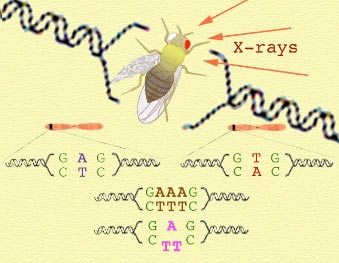Concept 27 Mutations are changes in genetic information.

The DNA sequences from two individuals of the same species are highly similar — differing by only about one nucleotide in 1,000. Each DNA difference results from a mutation — ranging from single nucleotide changes, to small repeated units, to larger insertions and deletions. Some mutations generate novel changes that are starting points of evolution, and some are responsible for disease. In humans, the vast majority of mutations occur in DNA regions that do not encode proteins. Most of these are neutral in terms of evolution or health; they have no negative or positive effect.
In the 1920s, DNA mutations were first induced in Drosophila using X-rays. Other types of ionizing radiation were also found to produce mutations. Ultraviolet radiation, a component of sunlight, causes specific kinds of DNA damage, including the linking of adjacent thymine nucleotides. Chemicals from a variety of man-made and natural sources are known mutagens. Also, DNA replication, itself, is not perfect and is a source of new mutations.
 DNA and proteins are key molecules of the cell nucleus.
DNA and proteins are key molecules of the cell nucleus. One gene makes one protein.
One gene makes one protein. A gene is made of DNA.
A gene is made of DNA. Bacteria and viruses have DNA too.
Bacteria and viruses have DNA too. The DNA molecule is shaped like a twisted ladder.
The DNA molecule is shaped like a twisted ladder. A half DNA ladder is a template for copying the whole.
A half DNA ladder is a template for copying the whole. RNA is an intermediary between DNA and protein.
RNA is an intermediary between DNA and protein. DNA words are three letters long.
DNA words are three letters long. A gene is a discrete sequence of DNA nucleotides.
A gene is a discrete sequence of DNA nucleotides. The RNA message is sometimes edited.
The RNA message is sometimes edited. Some viruses store genetic information in RNA.
Some viruses store genetic information in RNA. RNA was the first genetic molecule.
RNA was the first genetic molecule. Mutations are changes in genetic information.
Mutations are changes in genetic information. Some types of mutations are automatically repaired.
Some types of mutations are automatically repaired.